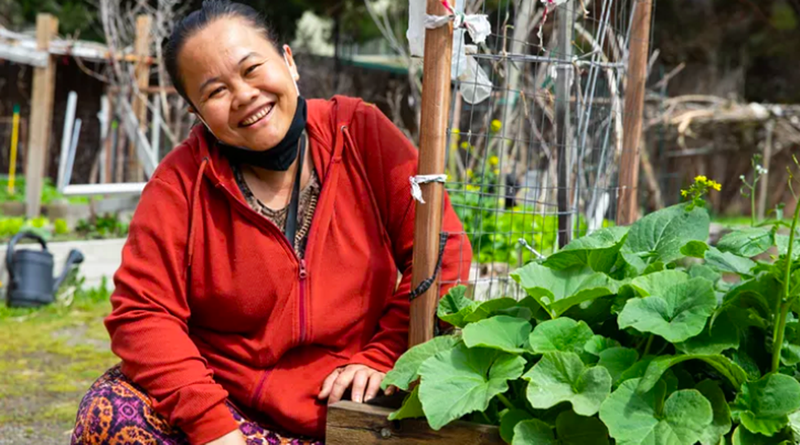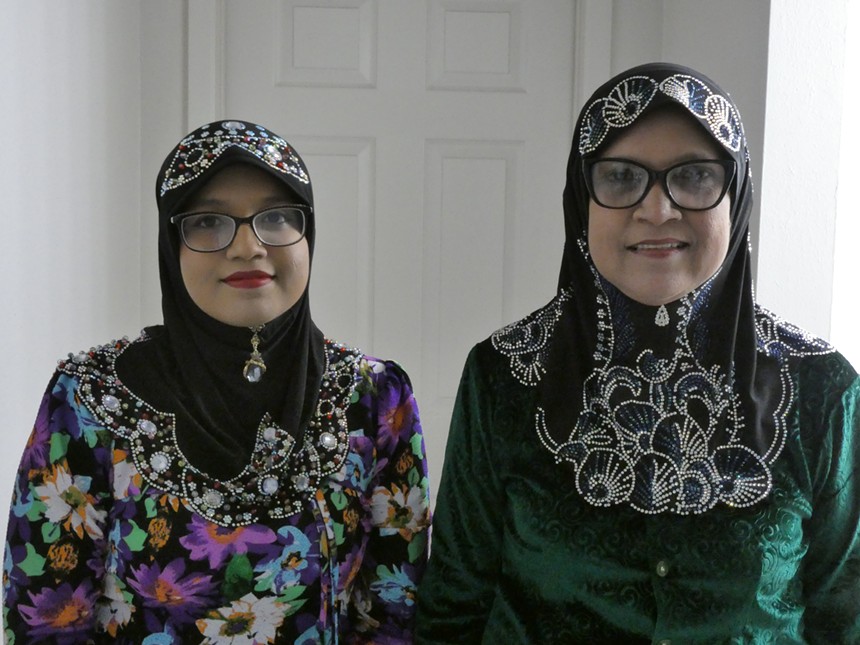This area is primarily a community of immigrants and refugees, many of whom know each other well. Refugees who land in Denver often live in the East Colfax neighborhood because it has a relatively large stock of affordable housing and many resources are centered there.
At the meeting, neighbors talked about their experiences living in the area and the violence they’ve encountered, demanding accountability. Some listened through translators, others spoke in broken English. One had a translator help share her story.
“As broken as their English was, they spoke their truth,” Kyaw Lwin Oo, son of Ma Kaing, said at the meeting. His family came to the United States from Thailand, where his older sister was murdered before they left. Like many refugees, they came hoping for the American dream — but their lives have turned into a nightmare.
Ma Kaing was a beloved member of the community who’d opened her own Burmese restaurant, Taw Win, at 1120 Yosemite Street in 2020. The 42-year-old mother and entrepreneur was a member of the East Colfax Neighborhood Association and helped start the East Colfax Food Bank at nearby Counterpath.
Her death was the most recent incident in a long line of senseless killings and shootings that police are not taking seriously, neighbors said. They talked about being hung up on when they called 911, or having to wait forever. Their community might be one of refugees, they added, but it still deserves the same level of security as other neighborhoods.
“Even though the people who live in this neighborhood give back and have given back to the community again and again and again, they feel like they have not been respected, that they have not been heard, that they have not been protected,” says Sharon Knight, president and CEO of Hope Communities, a nonprofit that provides affordable housing to people in need.
They want to feel safe at home...their new home.
A Community of Refugees
Fifty-one-year-old Hlaing Than is a refugee from Myanmar, formerly known as Burma, where he fought against the socialist regime. “At the time, I was an engineering student, and I was one of the activists in that movement,” he says. “They arrested me and put me in prison for ten years.”After escaping to Thailand, he came to the United States as a political refugee in 2008. He landed in New York but moved to Colorado two years later because he didn’t like the weather and had trouble finding work. He started out in Greeley and then moved to Hidden Brook; he found a job as an assistant teacher at Place Bridge Academy and now runs a grocery store. He lived in the East Colfax neighborhood for about nine years and now lives in Aurora near East Sixth Avenue and Potomac Street.
Back in Burma, if someone was involved in activity against the regime, they knew they would not be safe. For those not involved, life was likely safer — but that was never a guarantee.
In East Colfax, safety is never guaranteed, either. Than sees violent incidents at least once a month in the area, adding that “many families tell me they don’t dare go to the park.” Than doesn’t take his eight-year-old son to New Freedom Park, either.
Oo described it as a killing ground at the July 27 meeting.
“Ma Kaing’s incident, we feel really sad, and actually, we are scared because we are not born here and we have some language and cultural barriers, and we don’t know the system,” Than says. “We like [the] United States and its people, but we are refugees, so we need more help than normal citizens.”
Although Than was 38 when he came to the U.S., he felt like a kindergartner because of how much he had to learn about the language and the culture. “Even when I talk to somebody, I know English, I learned English in Burma, but my accent, even over the phone, I have to talk two, three [or] four times to understand the other party,” he says.“We like [the] United States and its people, but we are refugees, so we need more help than normal citizens.”
tweet this
Tyrone Campbell has been a technician with the Denver Police Department for 32 years; he says he’s seen how tough it can be to adjust. He recalls someone at a refugee center asking how much they would have to pay if they called 911. He points out that the DPD holds community academies where people can learn about how law enforcement works and ask questions. In addition to general academies, one is designed specifically for women and one for Spanish speakers, and a Burmese academy is a future possibility.
“Every time we do it, the questions that come in blow our minds, because it’s things like that. ‘If I call 911, is my immigration status going to be questioned?’ ‘If I get stopped by a police officer, am I going to get deported?’” Campbell says. “When you talk to people who are here, there’s a steep learning curve.”
Rashid Ullah is also from Burma. He and his family escaped to Bangladesh as refugees in 1992, when Burma was experiencing serious human-rights violations. In the refugee camps in Bangladesh, he recalls, most people only got an education up to grade five or seven, so he fled — but he returned when he learned that his family had been selected to come to the U.S. Ullah was twenty when his family arrived here in 2009. Although he knew some English, he says his family had to rely on interpretation everywhere.
When his brother was in the hospital, the family had to use interpreters to understand that the doctors were telling them he had a kidney stone.
He remembers when a woman from Burma and her two children were struck in a hit-and-run on East 14th Avenue and Yosemite Street in 2013, soon after he moved to East Colfax. She suffered serious injuries, and her two children were killed.
“A lot of the people who live in this community come from war-torn countries for a safe place to live, and that woman who was hit and lost her kids went back because of how bad it is,” Frank Anello, executive director of Project Worthmore, an organization that provides assistance to refugees, said at the July 27 meeting.
Fifty-five-year-old Saedah Yahya and her 22-year-old daughter, Raziyah Nurul Amin, have been living in the East Colfax neighborhood for a little over nine years. Yahya was born in Yangon, Myanmar, and moved to Rakhine State when she got married. Yahya’s husband was working at a mosque when the military came and told him that the mosque would have to empty out so they could tear it down and build a college. When he refused, they arrested him until the leader of his village was able to gather enough money to pay his bail.
The couple finally left in the ’80s, moving to Thailand in 1986 and Malaysia in 1992, where Amin was born. Malaysia was not welcoming to refugees, and the military would often conduct raids of people’s houses, destroying their United Nations High Commissioner for Refugees documentation. Yahya’s husband had to bribe the police so they wouldn’t arrest Yahya and her children just for being refugees, she says.
When her husband started having health problems, the UNHCR offered Canada, the United States or New Zealand as a place the family could go. They chose the U.S., and in 2012 their case manager set them up at an apartment in the East Colfax community.
Today, Yahya, Amin and Amin’s two-year-old son, Imraan, live in an apartment off East 12th Avenue, just a short walk from Taw Win and New Freedom Park. Yahya and her husband are separated, and he now lives with other family members in Indiana, which has one of the largest Burmese populations in the country. She and her daughter say they fear for their lives and want to leave East Colfax, but the cost of living keeps them there. “We even want to move now, but rents are really high,” Amin says. “I really can’t afford it. This is $1,150.”
At least the Burmese community is close there, but Amin says it’s difficult to see the hopes of refugees become dampened after they move to East Colfax.“We even want to move now, but rents are really high.I really can’t afford it."
tweet this
“There are so many kids around here and so many people who came to America thinking they are going to get what they did not get in their own country, they are going to get opportunity over here, they are going to get to live their life, they are going to continue their education, their parents are going to get all the medical treatments that they needed,” Amin says. “But it seems like they’re kind of disappointed, too. Over there we can’t live because it’s not our own country. Over here it’s like the same thing; we are constantly fearing about our lives.”
Amin usually gets home from work around 7:30 p.m., and says she starts hearing gunshots about an hour later. She fears for her mother, who works late hours. The parking at their apartment is on a first-come, first-served basis, leaving the 55-year-old to walk alone from her car late at night with little lighting around the apartment.
“It’s always somebody dying or somebody getting beat up...it’s always about somebody getting injured, and it’s always us refugees,” Amin says. “It looks like nobody’s ever doing anything for us.”
Searching for Solutions
Over the past several weeks, the East Colfax community has been coming together to share their experiences as public officials listen to their demands for a safer space and accountability.Given the language barrier, the community wondered if it would be possible for someone who speaks Burmese to work with the DPD as a translator. “I would love to say yes,” Campbell says, but he can’t. “Two things: Number one, that’s way above our pay grade, and second is we have a number of different communities within the city that we’re facing the same challenges with. It’s not that we’re unsympathetic; it’s how we resolve something that’s a fit for an entire city as a whole.”
Instead, the DPD looks for other officers within the department who might know the language, and often contacts the language line, a translation and interpretation service that connects it with someone who can translate.
The neighbors also want help with 911. So far in 2022, Denver has connected 8,057 calls to an interpreter, according to Kelly Jacobs, communications director for the Denver Department of Public Safety. Once a call taker recognizes that a translator is needed, an interpreter can come on the line in an average of eight seconds after a button is pushed, she adds. In 2022, 46 different languages have been used, with Spanish, Vietnamese, Arabic, Russian and Mandarin the top five.
Campbell stresses that when working with a community that is populated with a certain demographic, representation is also important. Before he resigned, Denver Police Chief Paul Pazen was working on a plan to allow non-citizens to become police officers.
“If we were able to do that, what that opens up is the opportunity for us to actually hire people to be able to come onto the police department, which could solve that issue,” Campbell says. “Our goal, of course, is to not only do that, but then provide a pathway to citizenship. If we can do that, that builds those things in. Now we can actually recruit people from the community to be police officers, which solves one problem; it also shows representation.”
Aurora, which has a large refugee population, actually took this step in 2019 as a solution to both recruitment problems and community complaints. Now the DPD, the Adams County Sheriff’s Office and the Pueblo Police Department are the only law enforcement agencies in the state that still have citizenship requirements.
The DPD is also struggling with staffing shortages, which contributes to slower response times as well as a lack of time to build relationships with communities. The department is down 168 people from what should be a staff of 1,600, with 64 cadets currently going through the police academy, according to Sean Towle, a DPD public information officer.
Although getting rid of the citizenship requirement could help solve a couple of problems, a proposal would have to be approved by Denver City Council, then taken to a vote, because the requirement is part of the city charter.
But even if the city gets more officers who are representative of Denver's diverse population, striking the right balance can be tricky. “Some folks want to see more officers in the area, but a different section of the community is li
ke, 'You're here too much,'" says DPD Commander Glenn West.“Some folks want to see more officers in the area, but a different section of the community is like, 'You're here too much."
tweet this
“Throwing more police cars at the problem doesn’t make it better,” notes Campbell. “That is traditionally across this country how communities have become over-policed. Nobody wants that, because it leads to an increase of stops and disproportionate data.”
Amanda Sawyer, the District 5 Denver City Council member who represents East Colfax, reached out to Pazen and Mayor Michael Hancock in 2020 to talk about safety issues in the area after a dramatic rise in crime, including a ten-day stretch with six shootings.
Since then, she says, the city has taken numerous steps that have actually reduced crime in the neighborhood by 34 percent. They include the DPD’s hot spot program, which focuses on cameras and shot-spotter technology in areas around Colfax, as well as a citywide gun-buyback program launched in March. Of the eight events that have collected 700 guns to be turned into garden tools, two have been in East Colfax. The city has also worked with Xcel Energy to bring more lighting to New Freedom Park, and cameras were recently updated there.
Sawyer is concerned that many refugees feel they’re being ignored by the city. “I hate to hear that,” she says. “I wish that there was a better way to work with them to kind of understand how we’re doing a number of different things to help the neighborhood. As a government actor, there’s a lot of mistrust there. A lot of these refugees came to East Colfax to escape persecution from their government. It’s difficult to trust the government the same way it’s difficult to trust the police department.”
Since Ma Kaing’s death, the police and the city have made other moves in the area. Emergency 911 calls the night of Kaing’s death went to Aurora, which is only blocks away. After discussions with the director of Denver 911, Verizon announced that it would install upgraded 911 call routing to better pinpoint where a caller is located.

The bullet that hit Ma Kaing came from New Freedom Park, where a group believed to be associated with a gang had gathered.
Westword
Arrests Are Made
On August 30, the DPD announced that it had arrested three suspects in the shooting of Ma Kaing; a fourth suspect was arrested shortly thereafter. Twenty-year-old Nu Ra Ah La, twenty-year-old Lu Reh, eighteen-year-old Pa Reh and nineteen-year-old Swa Bay are all facing investigative charges of first-degree murder with extreme indifference to value of life, attempted first-degree murder with extreme indifference to value of life, and illegal discharge of a firearm.According to the DPD, all four (and possibly a fifth suspect) were in New Freedom Park on the night of July 15 when they saw a car they didn’t recognize, thought didn’t belong there and began shooting. The bullets hit nearby buildings, and one struck Kaing.
The DPD says it believes the suspects are affiliated with a gang.
Between July 15 and the start of September, there were no additional homicides in East Colfax. But the area experienced five serious assaults, nine robberies and eight burglaries. While Amin sees more police in the area now, she thinks that the community deserved better protection long ago.
“It’s the police department,” she says. “It’s someone who we trusted for our safety, and no matter what type of person we are, they should have protected us from things. This is our lives we’re talking about. I have a son. My mom comes back late, around 2 or 3 a.m. What if something happens to her? What am I going to do?”















